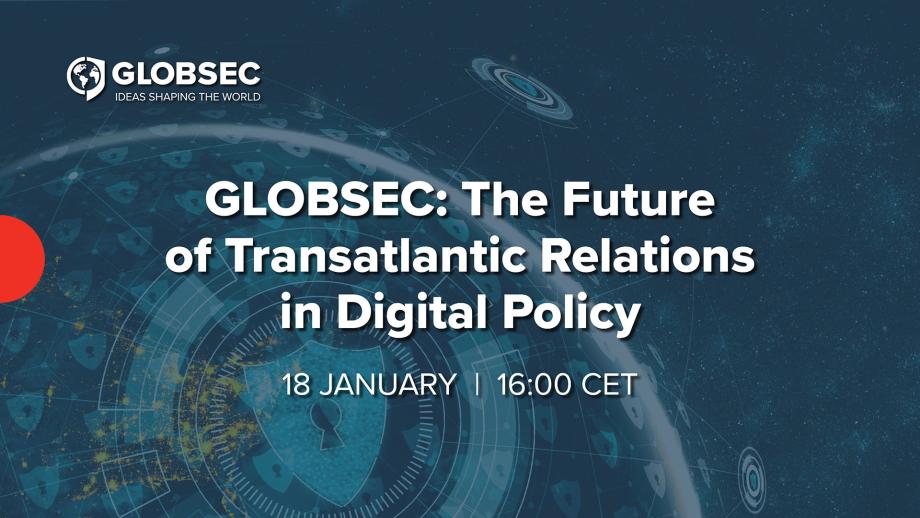Key Takeaways: The Future of Transatlantic Relations in Digital Policy

Tuesday, 18 January 2022
4:00 PM – 5:00 PM
This was an online webinar through ZOOM Platform
Context and questions
In December 2020, the European Commission presented its new digital legislation proposals. With record speed, the Council and Parliament took their positions in the last two months. At the same time, US Congress is reversing its historically hands-off approach to the internet, by introducing digital legislation bills of their own. The fact that the two blocs have decided to start regulating is the first step towards a common approach. Nevertheless, public discourse and political thinking on both sides of the Atlantic are still guided by different philosophies: In Europe, data security and citizens’ rights are in the centre while in the US, freedom of speech is a crucial factor. To bridge the schism of approaches will be difficult, but it’s in the interest of citizens’ welfare and economic prosperity. In a GLOBSEC webinar, following questions were addressed to find a future solution:
- What is needed to intensify transatlantic collaboration on tech policy?
- What will be the ultimate proposed deadline in order to keep up with third countries?
- How can we better involve stakeholders of all kinds from both sides of the Atlantic?
Speakers
- Toomas Hendrik Ilves, former President of Estonia, former MEP (S&D)
- Eva Maydell, MEP (EPP)
- Christian Borggreen, Vice President & Head of Office, Computer and Communications Industry Association Europe (CCIA), Brussels/Washington
- Shane Tews, Nonresident senior fellow, American Enterprise Institute (AEI), Washington
Key takeaways:
- The current digital policy agenda is an important legislative project, but it’s trivial in the larger strategic sense. Both the European Union and the United States need to understand who the real competitors and adversaries are. China is rapidly moving ahead of the west when it comes to tech innovation.
- The DMA is a perfect example of a legislation designed to increase competition, but in its current form risks decreasing digital security for all of us. Opting for the lowest common denominator in the negotiations in terms of security strategy has led to a legislative act that loses track of the real solutions.
- You cannot regulate your way into innovation. All stakeholders in the EU need to understand this. It seems to be a perspective easier to understand for stakeholders in the US. Furthermore, a global perspective on innovation and how to support it is the way forward while having security as a common interest.
- The US can learn a lot from the principles of the EU GDPR. Most US stakeholders understand that data need to be protected, but it’s hard to find a transatlantic approach when the DMA is set to release that data again to enforce competition practices. It cannot be underestimated how important the protection of personal data is, for both the citizens and the business around the world.
- The uncertainty that is visible in the transatlantic industries right now is bad for investments and is currently impacting the EU and US economies. One of the tasks of the TTC is to solve the problems that cause this uncertainty.
- The EU is overestimating its position in the digital agenda. The US won’t be impressed by the digital policy legislation as the real digital innovation currently originates in the US. As a leader of digital innovation, US stakeholders are needed to effectively regulate. The EU and US have the opportunity to set out a shared vision, rooted in democratic principles and economic openness, to counter authoritarian approaches to technology and trade.
- Of course, regulation is necessary, but it is important that in the EU Single Market, a common set of EU goals are first pronounced by the Member States. This will be beneficial in a transatlantic approach.
- If the EU and US want to come to convergence on the transatlantic differences, we need to recognize our differences and openly talk about them.
- The framework within which the digital debate takes place, is the global conflict between authoritarianism and democracy in which technology and regulation play an enormous role. We should always emphasise the interdisciplinary character of our debates and not think in silos, because the opponents are not doing that either.
- The pitfalls for the EU of regulating technology while not being the most successful competitor in business terms are in the need to find a fine balance between regulation in favour of privacy and citizens’ rights and supporting innovation and growth.